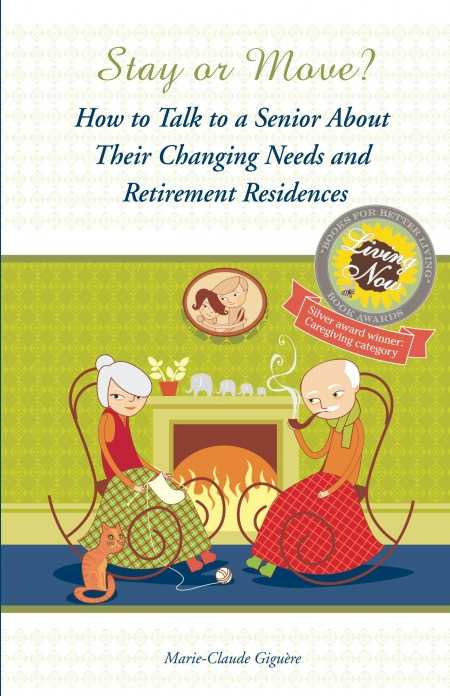
Stay or Move?
How to Talk to a Senior About Their Changing Needs and Retirement Residences
This family-friendly guide helps ease the elderly and their loved ones into choosing the right retirement residence.
In Stay or Move?: How to Talk to a Senior About Their Changing Needs and Retirement Residences, Marie-Claude Giguère offers a professional yet family-friendly guide to dealing with the transitions that often come with aging. When armed with information and support, what could be a stressful experience for many can become something quite positive.
Stay or Move? provides caregivers with excellent and historically proven steps to detecting and defining needs, seeking and determining which help is available and necessary, and communicating effectively with all those involved. Giguère shares important signs to look out for in seniors, such as loss of autonomy, physical limitations, withdrawing from social activities, and becoming more homebound. She addresses the need for caregiving and where it will take place: whether the loved one can continue to live in his or her own home or with a caregiver, or if a retirement residence would better suit the loved one’s needs.
A short, brochure-style book with an adorable cover and similar images within, Giguère writes as though she is joining you at your kitchen table over a cup of coffee. This conversational style helps to ease the fears associated with how to best aid an elderly loved one in the next big step in his or her life. The text is full of scenarios that readers can use to recognize concerns they might have about their own loved one. Steps are suggested if a senior needs to sell his or her home.
“Retirement residence” is defined, as are the four residence categories, how much they cost, and what type of care each provides. The guide ends with a helpful Questions and Answers section: “My grandmother has Alzheimer’s or memory loss. How do I talk to her about moving?”; “How can I tell if a residence is good?”; “Will they control my parents’ finances in a private facility?”; and “Can my dad still smoke and drink in a residence?”
Giguère has spent the past fourteen years working with seniors and their families to determine their needs and to help them find the right retirement residence. She suggests “doing your homework before a crisis happens,” but she recognizes that this is not always possible. Because of this, and because of her extensive visits to more than 350 privately run retirement residences in Canada, the United States, France, and Belgium, she is able to give caregivers the tools they need to assist them in helping their elderly loved ones.
Though the very idea of participating in your loved one’s life in this way can feel quite daunting—whether you’ve had time to plan or it came upon you suddenly—Giguère believes that “getting your elderly loved one the right help is something to be proud of.”
Reviewed by
Tammy Snyder
Disclosure: This article is not an endorsement, but a review. The publisher of this book provided free copies of the book and paid a small fee to have their book reviewed by a professional reviewer. Foreword Reviews and Clarion Reviews make no guarantee that the publisher will receive a positive review. Foreword Magazine, Inc. is disclosing this in accordance with the Federal Trade Commission’s 16 CFR, Part 255.
